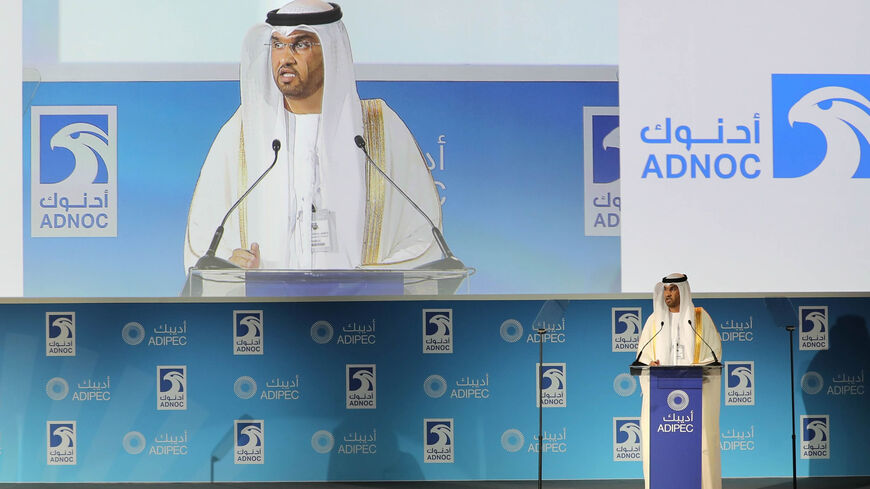The president-designate of the COP28 climate summit, Sultan Ahmed Al Jaber, spoke Tuesday about the direction of the United Arab Emirates’ plan ahead of the November event.
During his speech on the third day of the World Government Summit in Dubai, Jaber — who also serves as the UAE's special envoy for climate change — said he will lay out a road map for COP28 that is “inclusive [and] results-oriented,” which he promised is “far from being business as usual."
Jaber heads the Emirates' state oil producer — the Abu Dhabi National Oil Company (ADNOC) — a role that has raised criticism among activists who question whether the head of a traditional oil and gas company can also lead the sustainable energy movement.
Jaber said during his speech that his position and resources will serve more as an asset than an obstacle to energy transition.
“It is our common interest to have the energy industry working hand in hand alongside everyone on the solutions that the world needs,” he said, adding that he will capitalize on using his experience and network of partners to engage with governments, civil society and technology companies.
When Jaber's role in leading the climate summit was announced in January, some activists called for the oil chief’s resignation from the climate summit, and petitions in this regard emerged from the nonprofit The Climate Reality Project (founded by former US Vice President Al Gore) and Change.org, among others.
The head of one of the world's biggest oil companies has been named to lead the #COP28 global climate talks in Dubai. We're joining @ClimateReality and @CANIntl in calling for Sultan Ahmed Al Jaber's resignation from @ADNOCGroup. ➡️ Sign the petition now: https://t.co/Kj0OP7oixe pic.twitter.com/wrTbABk9ge
— Climate Reality Canada / Réalité climatique Canada (@Reality_Canada) January 16, 2023
And more recently on Monday, Amnesty International’s program director for climate, economic and social justice, and corporate accountability, Marta Schaaf, said that Jaber cannot be an honest broker as his company continues to increase oil and gas production.
“Sultan Al Jaber, the chief executive of ADNOC — one of the world’s largest oil and gas producers — plans to increase the group’s production of fossil fuels. This is entirely incompatible with his role as president-designate of COP28,” said Schaaf.
Jaber's call to involve all stakeholders was echoed by International Monetary Fund managing director Kristalina Georgieva, who said while speaking on Monday that "we need all hands on deck."
"We don't participate in the selection, but we need everybody,” she said at the summit event of government and private sector leaders.
On Tuesday, she joined Jaber and other heads of institutions and nations in a high-level closed session on climate finance held by the Emirati Ministry of Finance, reported UAE state news agency WAM.
“We and the UAE are not shying away from energy transition; in fact, we are running toward it,” said Jaber, highlighting his country’s history of heading in that direction.
The UAE was the first country in the Middle East and in North Africa to set net zero greenhouse gas emissions by 2050, in line with the 2015 UN Paris Agreement.
A recent partnership with ADNOC, Abu Dhabi’s sovereign wealth fund and others are set to make subsidiary and future energy company Masdar one of the largest renewable energy investors globally, according to WAM, targeting at least 100 gigawatts of renewable energy capacity in the country by 2030.
“We have to transform entire industrial systems that still rely and run on the energies of the first industrial revolution,” said Jaber, whose country’s gross domestic product is 30% directly based on hydrocarbons and depends heavily on profits from oil and gas exports for a great majority of its government revenue.
“If we make the right investments today, there will come a time when the UAE will celebrate the last barrel of oil,” he continued, which he said included tripling renewable energy capacity, doubling hydrogen production, and expanding nuclear power and battery storage among other factors that require the scaling up in the private sector and with technology.
“The hard reality is that global emissions must fall 43% by 2030; that’s just seven years away,” he said, noting that the world needs a major course correction.
At the World Government Summit, managing director of the International Finance Corporation Makhtar Diop said that in order to close this major gap, world leaders need to make direct investments.
He estimated that $9 trillion of investment needs to be made annually to tackle climate action and nearly $1 trillion annually to enforce energy transition in certain countries.


.jpg?h=484aaada&itok=l9O0K7bm)





